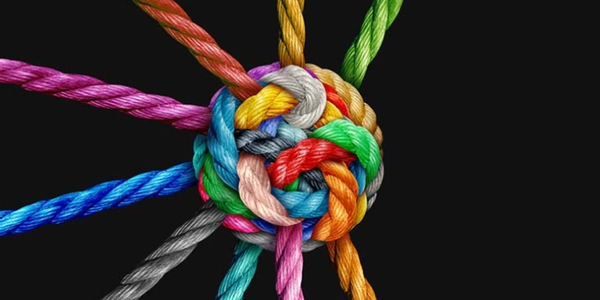Weekend Edition: I do not think this word means what you think it means...
What does "moderate" or a "Moderate" or "to moderate" really mean in American civic life? Even if we could figure out which one means what, I don't think it's the guide we need.

If you offer Liberal-Moderate-Conservative as the only ideological choices in a poll, people will end up in the Moderate category for a lot of very different reasons. People who tend to vote Democratic are going to interpret that label very differently than people who tend to choose Republican candidates. People who embrace their unaffiliated independent voter status will embrace a whole different relationship to that label. And within that group is a wild diversity of perspectives on policy from folks who accept the label of Moderate when forced to choose along side folks who embrace it with genuine passion. If you ask people a series of policy preferences and they have both very extreme liberal and conservative positions, they will end up being labeled Moderate. Saying the Democrats want more "party moderation" means almost nothing without more context.
As Donald Kinder and Nathan Kalmoe put it in their book Neither Liberal Not Conservative after looking at five decades of public opinion research, “the moderate category seems less an ideological destination than a refuge for the innocent and the confused.” Other versions of this debate come up constantly. Lee Drutman. David Broockman. Donald Kinder again. Which Moderates? Moderate on what? Moderate how?
But one of Kinder's other conclusions points to a better way to understand what might really drive people and help us understand them: "for most people, political preferences arise less from ideological differences than from the attachments and antagonisms of group life." So if this 1-dimensional polar spectrum isn't a good way to understand people (especially people who aren't hyperpartisans which is most people), what are people calling for with moderation? And how might we find a better way of meeting people's need for a better politics (and a better party) by focusing on what we believe and what we want over what we are called?
What I hear most in my communities and circles right now is a shift away from the usual "what I really want is moderation in tone and posture across all of politics" which I usually interpret as a desire to turn away from the bullying, hyperbolic, bellicose posturing of most political rhetoric toward a different, deeper conversation about the nature of the Democratic Party:
"Is an increasingly liberal Democratic Party out of step in ways that make it impossible for it to reclaim either cultural or political power?"
Even this question needs unpacking – traditionally liberal in policy, in philosophical terms? Liberal in adherence to tradition and process as institutionalists? Liberal in desired outcomes? Or pejoratively Liberal in narrative framing and focus? Each of these questions is worth unpacking but how differently we are using the label liberal in each one reveals the problem with the blanket "more moderate Democratic Party" conclusion that too many headlines seem all to comfortable embracing.
When I have deeper conversations with most people, they see a world around them that feels unfair, unjust, and uncreative. And despite the incredible alignment on the feeling and experience of being deeply disenchanted with civic life, they ascribe these feelings to wildly different sources depending on their identities, communities, and base ideological orientation. Most (regardless of these differences) express a desire, even a craving to be engaged and useful, but feel like their reach for their own ambitions is being shortened or limited by corruption of all sorts from corporate control to monopoly power to party machinery to clownish information systems. In the end, most feel like creativity and opportunity are out of reach, and while they don't want things handed to them, they do want stronger, more effective public supports for daily life and reliable guardrails and accountability on inequality, injustice, and power. Public systems are how we do together what we can't do on our own, how we deliver for each other, and are expressions of our duty to and belief in each other.
There is broad public support (sustained over the last decade or more in Pew and Gallup research) for public systems that sound like strong community and individual access to and investment in housing. Better social and mental health supports. Boader training for and access to community care like in-home elder care. Better pay and better reimbursement for family who are primary caregivers for other family members. Better investments in parents. Broader participation in the wealth and resources generated by the explosive innovation of modern society that rebalances the communization of costs and privatization of profits at the heart of the tragedies of the commons we face all around us. Policies that encourage entrepreneurship and support risk taking in communities that don't have their own private, intergenerational wealth as backstop for experimentation, innovation, and ambition. Policies that encourage shared investment and shared benefit in building and rebuilding our shared infrastructures. People are routinely clamoring for many of the policies often labeled most liberal within the broader Democratic platform. But for any number of reasons, don't associate them with or want to associate themselves with the Democratic Party. People wanting these systems but not the party isn't a failure of people to understand: it's a failure of the party to engage people effectively. What we are seeing is a broad and diverse majority of people who want liberal governance but are afraid of liberal politics.
If people want these things for themselves and for their communities and if they still believe that narratives that center the values and stories most widely held across this broad majority of Americans cannot work as a mechanism of storytelling and building cultural coherence, power, and momentum then there's a profound disconnect between what we want, how widely we see that shared desire held, and how we think we can get those things as a matter of cultural and political strategy.
The fear of liberal politics is rooted in legitimate failures of the Democratic Party to define itself and its underlying philosophical foundations of the liberalism it has embraced. We have failed to engage people in the right ways at the right altitude in the moral foundations of why we believe what we believe and adopted a smug, self-righteous tone on these moral arguments as we mistake them for self-evident factual ones for the better part of the last generation. It has made the party smaller, more homogenous in its thinking while attempting to surface and center more diversity in every other way, and less relevant in more and more of the country – contributing to the sense that more and more of the country is out of reach. But there is also a fear-based, mistaken belief that because of results of the last cycle and the actual imbalance of power and the perceived imbalance of culture in this country that we are experiencing some profound rightward political shift as a nation. This conclusion is a bad, fear-based, pseudo-strategic retreat from liberal policies in a country not actually shifting right but in which conservative narratives are culturally coherent and powerful in ways that liberal narratives and framing have failed to match and that make it seem like the country is shifting right when in fact the right edge of the country is small and hardened in a culturally homogenous way that makes it seem larger, more pervasive, and more mainstream than it actually is.
So this abandonment of a liberalism that consistently and proactively delivers for people, that takes care of the things we need to do together, that cares for the people in the process of delivering for them, and that invests in communities isn't actually a shift in ideology or belief, but rather a weak-kneed abandonment of people who deserve to be protected and cared for as a desperate search for a new strategy in the face of our failure to build culture, to win power, and to deliver results. This misaligned belief is reinforced by the wildly antidemocratic features of our republic that allow 20% of the country to dominate the levers of power and appear to dominate culture has us on our heels. The new strategy we need is the shift in liberal politics we need to get the liberal governance we want.
What we need is to embrace and engage in the moral argument for the soul of both country and community as a moral conversation about right and wrong, to embrace the argument about what we believe and what we want that speaks directly to the heart of what it means to be liberal and to want liberal governance and to win cultural power on liberal principles. Because we believe in the inherent worth of every person, we protect everyone's dignity and rights. Because we are deeply interconnected to others, we are committed to our solidarity and shared prosperity. Because we embrace that solidarity and accept the interdependence reflected in the everyday reality that we all need something from someone (but often can't predict what and from whom), we want to invest broadly, deeply, and fairly in our collective opportunity. Because we embrace the abundance possible from our shared prosperity, we want public systems that protect equal freedoms for everyone and that ensure fair access to economic systems that work for everyone where both access and benefits are fair and reciprocal. Because we embrace our shared duty to each other as an opportunity to be useful, we take responsibility for and seek opportunities to be of service and participate in the leadership and decision-making of our communities and our country.
Strategically, we need to lean forward into this deeply held moral clarity, push forward into more complex cultural spaces, stake out new ground for why we believe what we believe in the cultural conversation about our most urgent transformative policies and systems changes as the answers to the pains and dysfunctions that are driving people's sense of disenchantment and animate the populist reactionary responses to inequality and injustice in both liberal- and conservative-minded communities. This new moral clarity is the guide to a path to liberal governance and demands that we engage in this moral argument across cultures as the antidote to much of the religious fervor of MAGAists who are captive to the cruel oversimplified zero-sum lies of a conservative political machine intent on transforming their pain into power and profit with no intent to solve problems for anyone.
What we need to be how we need to lead. Be committed to people and solidarity and justice and the iron-clad commitment to deliver for people. And then deliver for people. Do the things; don't perform the commitment and then stop short of delivery. Stay in the argument over what we believe: don't take it for granted or assume its self-evidence. The answer here is more of what matters most, not less, not some softer expression, not some milquetoast approach, not a safe turn toward compromise – not moderate anything. Bold, unabashed love for and solidarity with others. Deep commitment to care for and duty to others. A sacred promise to do together the things we cannot do alone. Unshakable belief that sacredness and joy can define our civic life and that our future can be kinder and more abundant than our present. I'm not interested in moderating how much I love my neighbors or my country. And I want a nation shaped by that same passionate commitment to people and that same ironclad belief in what we can do together for each other.
Last updated: 13 Apr 2025




